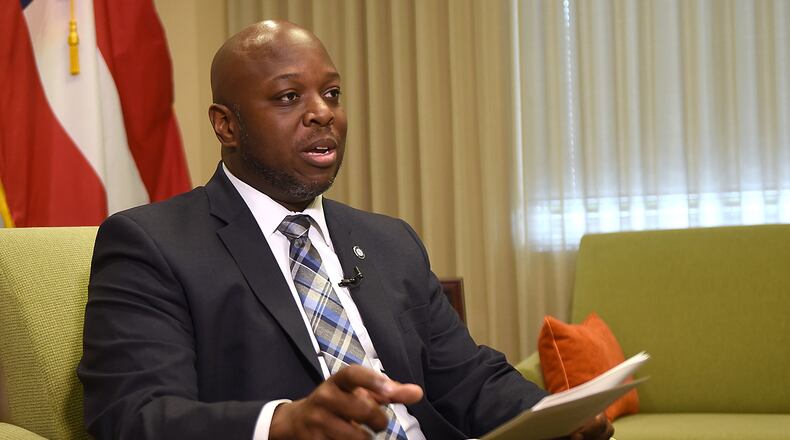Georgia’s new juvenile justice commissioner wants to know every time corrections officers assault inmates in the state’s youth prisons.
But first, a prison’s director has to tell a regional administrator, who reports to an assistant deputy commissioner, who reports to a deputy commissioner, who, finally, may bring the matter to Commissioner Tyrone Oliver.
This multilayered chain of command illustrates the organizational and cultural challenges that confronted Oliver when he took over the state Department of Juvenile Justice in July.
The agency has long operated under a militarylike hierarchy, with top officials far removed from the chaotic environment of the facilities where it confines young offenders. At the same time, the state’s punitive juvenile justice laws are mirrored in the harsh treatment of juvenile prisoners.
Oliver insists this must change.
» RELATED: Violence permeates youth prisons
» VIDEOS: Excerpts of chaos and violence in Georgia’s youth prisons
“I have all of my employees’ backs 110%,” Oliver said in an interview at the agency’s Decatur headquarters. But “I’d rather work short than have staff members abuse their power and abuse the youths. That’s not right. It’s not going to happen, if I know about it.”
In a recent memo to the department’s 4,400 employees, Oliver said not tolerating mistreatment of youths in custody is key to cultural change. “To get to where we want to be,” he wrote, “there must be the acceptance of responsibility and accountability for all actions, from me all the way to the newest employee.”
This was the approach that Oliver, 40, used in his previous job: police chief in Social Circle, population 4,500 — barely more than the workforce at Juvenile Justice. Although he had been a jailer earlier in his career, Oliver had no experience in juvenile justice and no experience managing so large an organization. He replaced Avery Niles, who was fired last summer for misrepresenting his educational credentials.
Under Niles, the department terminated dozens of officers for using excessive force on youths. But the agency almost never filed criminal charges against those officers — just six times in the past four years, an investigation by The Atlanta Journal-Constitution found.
In a particularly violent incident in 2017 at the juvenile prison in Americus, three officers forcefully slammed two prisoners to the floor. One youth went to the hospital with a concussion. The agency fired all three officers but filed no charges.
“If you see that today,” Oliver said after watching surveillance video of the incident, “there will be charges.”
Credit: Ryon Horne
Credit: Ryon Horne
However, he said the department will not second-guess officers’ decisions in altercations with prisoners, who often assault the guards or provoke confrontations by throwing urine on them.
“We look at it in totality,” Oliver said. “We try to look at it through the eyes of the officer at the time of the incident.”
Oliver’s challenge is to hold officers accountable for misdeeds without damaging morale. With about half of corrections officers’ positions unfilled, overtime shifts are common. The turnover rate for entry-level officers reached 130% for the 12 months ending June 30.
Pay is low, starting at less than $28,000. Prospects seem dim for significant raises after Gov. Brian Kemp ordered agencies to come up with proposed budget cuts for next year. Much of the savings that Oliver suggested to the Governor’s Office would come from eliminating positions the department has been unable to fill.
» PREVIOUSLY: Deadly consequences: Murder case exposes a system's failings
» RELATED: How fear, politics forged Georgia's punitive juvenile laws
» MORE: 'Second Chance Court' shows promising results
“Obviously, we have a challenge there,” he said of the need for higher pay. But “I don’t know if it’s going to be actually feasible in the near future.”
Oliver must deal with other problems, among them a strong gang presence inside juvenile facilities and a persistently high recidivism rate for juvenile offenders. The most recent data available shows that about two-thirds of youths released from the department’s prisons commit additional crimes within three years.
Oliver wants help from nonprofit organizations, community groups and others to mentor youths in and out of the department’s facilities, to help them find jobs, to show them that life outside gangs can be fulfilling.
Funding would have to come from private sources; the department doesn’t have the money.
Oliver’s first priority, he said, is operating safe, secure facilities. It’s important, he said, to instill mutual respect among officers and youths.
“There’s a reason why they’re there,” he said of the prisoners. “But we still can’t treat them like we treat adults. It’s our job to transform them into productive members of society.”
About the Author
The Latest
Featured



